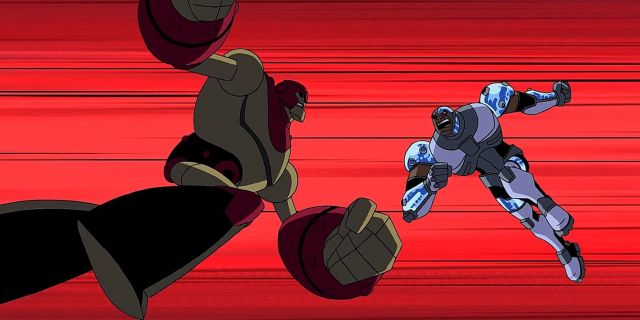Quick Links
- Who is Atlas?
- What Does Atlas Want?
In the 2003 Teen Titans series, adversaries to the heroes tend to fall into one of two categories. Some are young, naive, or simple-minded villains whose hearts can be changed to a different point of view. Others are evil masterminds with nefarious intentions who recruit the simpler villains to do their bidding. Slade one such mastermind, as are those behind the organizations of the H.I.V.E. Academy and the Brotherhood of Evil. While the Titans are able to bring many of their foes to the good side, most of the show’s other villains are seen working for one of these entities at some point or another.
This includes the easy-to-manipulate Plasmus, the zany Mad Mod, H.I.V.E. recruits Jinx, Mammoth, and Gizmo, and the desperate-for-life Puppet King, among many others. These villains are depicted as having one-track minds, irrationally intense fixations that drive their evil acts. Even when the Titans can’t show them the error of their ways, the flaws in their logic are still apparent and understood. In fact, while the Titans are able to open some minds, those that resist are depicted as falling victim to their own insecurities. The robotic Atlas and his henchman are a prime example.
Who is Atlas?

|
Atlas in Teen Titans |
|
|---|---|
|
First Appearance |
Season two, episode four, “Only Human” |
|
Final Appearance |
Season five, episode twelve, “Titans Together” |
|
Played by |
Keith David |
When he is first introduced, Atlas functions as a way for Cyborg to blow off steam. In season two, episode four, “Only Human,” Cyborg grows frustrated while training with the rest of the team. He struggles while lifting weights, and when he wants to bail on his set, Robin refuses, encouraging him to push himself. Cyborg fails and, both irritated and embarrassed, explains that “pushing himself” isn’t the same option for him as it is the rest of the Titans. His mechanical body has limits, and no amount of trying harder can expand them. The team is sympathetic and apologetic, but the damage is done. Cyborg, a former athlete who once thrived when testing his limits, feels the bruise to his ego.
While the rest of the team wonders how to bring him out of his funk, Cyborg plays video games. His mood seems to hinge dangerously on how he performs in the game. He reminds himself that online, he has no limits, and he unleashes his anger and emotion onto his digital adversary, a player named Atlas. With effort, Cyborg defeats Atlas in the racing game, and he picks himself up, seeming to feel better. That is, until Atlas appears in the flesh (or rather, in the metal), breaking a hole in Titans Tower and ripping Cyborg right out of it.
Atlas, it becomes clear, is a massive robot. He’s at least twice the size of Cyborg and fully mechanical. Atlas is extremely competitive and self-absorbed. His only companion is his human mechanic, Spike, who is at Atlas’ beck and call, despite the mistreatment he receives. Atlas seems to be entrenched in the mechanical and technological world. Spike functions as his only consistent human contact, and Atlas is clearly disinterested in him.
What Does Atlas Want?
The nature of Atlas’ goal in “Only Human” (and the fact that this is his first appearance in the series) speak to the simple nature of his thoughts and desires. When Cyborg is ripped from Titans Tower, the rest of the Titans leap into action, ready to join him in battle. However, Cyborg and Atlas both insist on a fair fight between the two of them. Atlas is stung by his loss in the video game, and given what Cyborg has just been through emotionally, it makes sense that he feels the need to prove himself. But it seems that this attitude is par for the course for Atlas. He goes so far as to imprison the rest of the Titans as an incentive to urge Cyborg to fight him. Otherwise, though he seems disinterested in the other heroes.
No one defeats Atlas!
This, plus the fact that this is the first bit of trouble he has caused the Titans or Jump City, suggest that Atlas is more of a formidable sore loser than he is an evil villain. Robin picks up on Atlas’ mistreatment of Spike and tries to get in his head, both for Cyborg and Spike’s sake. When Atlas dumps a barrel of oil on Spike because it’s the wrong temperature, Robin asks Spike why he allows himself to be treated this way. Atlas perceives winning — at video games or anything else — to be an indicator of superiority. Judging by his reaction to Cyborg’s victory, he doesn’t lose often. Thus, Atlas considers himself supreme, and Spike expresses fear of being on his bad side if he were to cross him.
Ultimately, Spike gains the courage to disobey Atlas. This forces Atlas to realize he doesn’t know how to do everything on his own that Spike was doing for him, giving Cyborg the upper hand to defeat him. While Atlas himself is not the target of a change of heart in this episode, the character of Spike depicts the power of friendship and standing up for oneself. While this doesn’t awaken anything in Atlas, none of his future appearances include Spike, and he is presumably weaker without his beaten-down henchman.











Leave a Reply